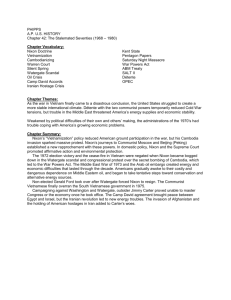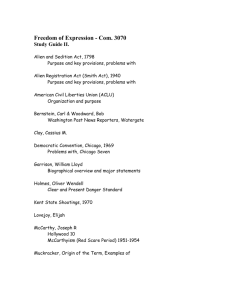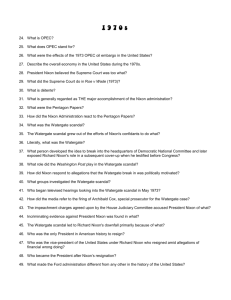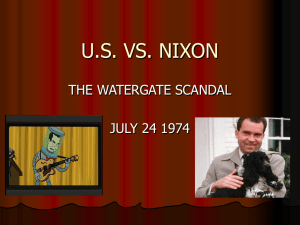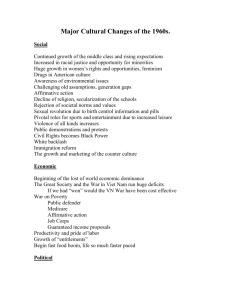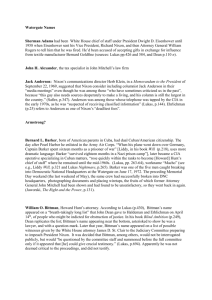Watergate Background Information
advertisement
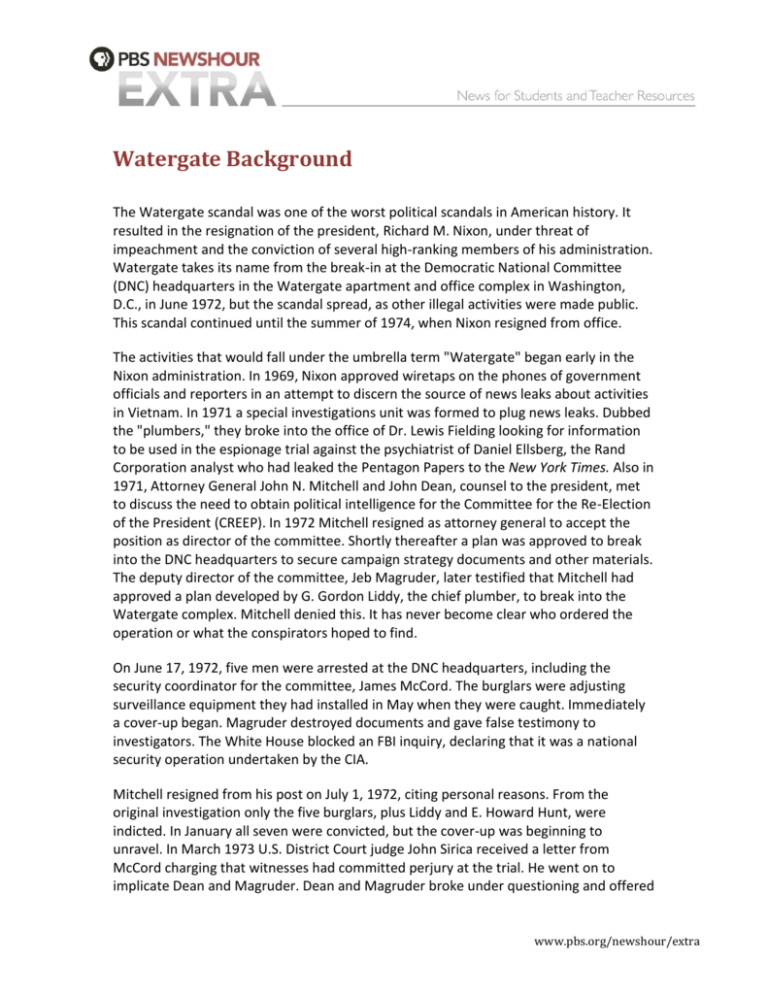
Watergate Background The Watergate scandal was one of the worst political scandals in American history. It resulted in the resignation of the president, Richard M. Nixon, under threat of impeachment and the conviction of several high-ranking members of his administration. Watergate takes its name from the break-in at the Democratic National Committee (DNC) headquarters in the Watergate apartment and office complex in Washington, D.C., in June 1972, but the scandal spread, as other illegal activities were made public. This scandal continued until the summer of 1974, when Nixon resigned from office. The activities that would fall under the umbrella term "Watergate" began early in the Nixon administration. In 1969, Nixon approved wiretaps on the phones of government officials and reporters in an attempt to discern the source of news leaks about activities in Vietnam. In 1971 a special investigations unit was formed to plug news leaks. Dubbed the "plumbers," they broke into the office of Dr. Lewis Fielding looking for information to be used in the espionage trial against the psychiatrist of Daniel Ellsberg, the Rand Corporation analyst who had leaked the Pentagon Papers to the New York Times. Also in 1971, Attorney General John N. Mitchell and John Dean, counsel to the president, met to discuss the need to obtain political intelligence for the Committee for the Re-Election of the President (CREEP). In 1972 Mitchell resigned as attorney general to accept the position as director of the committee. Shortly thereafter a plan was approved to break into the DNC headquarters to secure campaign strategy documents and other materials. The deputy director of the committee, Jeb Magruder, later testified that Mitchell had approved a plan developed by G. Gordon Liddy, the chief plumber, to break into the Watergate complex. Mitchell denied this. It has never become clear who ordered the operation or what the conspirators hoped to find. On June 17, 1972, five men were arrested at the DNC headquarters, including the security coordinator for the committee, James McCord. The burglars were adjusting surveillance equipment they had installed in May when they were caught. Immediately a cover-up began. Magruder destroyed documents and gave false testimony to investigators. The White House blocked an FBI inquiry, declaring that it was a national security operation undertaken by the CIA. Mitchell resigned from his post on July 1, 1972, citing personal reasons. From the original investigation only the five burglars, plus Liddy and E. Howard Hunt, were indicted. In January all seven were convicted, but the cover-up was beginning to unravel. In March 1973 U.S. District Court judge John Sirica received a letter from McCord charging that witnesses had committed perjury at the trial. He went on to implicate Dean and Magruder. Dean and Magruder broke under questioning and offered www.pbs.org/newshour/extra testimony that implicated White House and Nixon campaign officials. Dean testified that Mitchell had approved the break-in with the knowledge of White House domestic adviser John Ehrlichman and chief of staff H. R. Haldeman. In May 1973 Senator Sam Ervin (D-N.C.) opened a special Senate committee investigation into the affair. At the same time, Attorney General Elliot L. Richardson appointed Archibald Cox, Jr., as special prosecutor to investigate the entire affair. Cox soon uncovered widespread evidence of political espionage, illegal wiretaps, and influence peddling. In July 1973 it was revealed that Nixon had secretly recorded conversations in the White House since 1971. Cox sued to obtain the tapes. On October 20, 1973, Nixon ordered Richardson to fire the special prosecutor. Richardson refused and resigned; his assistant, William Ruckelshaus, refused and was fired. Finally, Solicitor General Robert Bork fired Cox. This became known as the "Saturday Night Massacre." It led to calls for Nixon's impeachment, and the House of Representatives began an impeachment investigation. Following Nixon's firing of Special Prosecutor Archibald Cox, in April 1974 Nixon appointed a new special prosecutor, Leon Jaworski. Upon assuming office, Jaworski subpoenaed 64 tapes needed for the trials resulting from the indictments. Nixon refused to comply with the subpoena and proposed a compromise in which he offered to provide edited transcripts in place of the actual tapes. The 1,254 pages of transcripts contained embarrassing material, including a large number of presidential deleted expletives; they were also inaccurate and incomplete. The inaccuracies were exposed when the House Judiciary Committee released its version of the tapes. U.S. District Court judge John Sirica, who had issued the original subpoena, rejected the transcripts as unacceptable and reissued an order for the original tapes. James St. Clair, the head of Nixon's Watergate defense team, appealed Sirica's ruling to the Court of Appeals. Jaworski, wishing to expedite the process, appealed directly to the Supreme Court. The Court agreed to hear the case, United States v. Nixon, on July 8, 1974. Nixon's case rested on two issues. First, the administration questioned the judiciary's jurisdiction in subpoenaing the tapes, citing separation of powers. Second, the administration cited executive privilege, the need for the protection of communication between high government officials and their advisers. The Court unanimously rejected both claims in a ruling on July 24, 1974. On the first point, the Court cited Marbury v. Madison (1803), which affirmed the power of judicial review. As for the second point, Chief Justice Warren Burger argued that neither separation of powers nor the need for confidential communication allowed for absolute presidential privilege of immunity from the judicial process. On August 5, 1974, the transcripts were released, including one particularly damaging to Nixon, in which he discussed using the CIA to obstruct the FBI investigation of the Watergate break-in. These tapes led to the indictments of Haldeman, Ehrlichman, www.pbs.org/newshour/extra Mitchell, Charles Colson, Robert Mardian, and Kenneth Parkinson for conspiring to cover up the Watergate scandal. Colson pleaded guilty to charges stemming from the Fielding break-in and the cover-up charges were dropped. Ultimately, Haldeman, Ehrlichman, and Mitchell were found guilty. Facing a congressional vote on impeachment, Nixon announced his resignation on the evening of August 8, 1974, to be effective the next day at noon. Information taken from: Korasick, John. "Watergate scandal." In Critchlow, Donald T., and Gary B. Nash, eds. Encyclopedia of American History: Contemporary United States, 1969 to the Present, Revised Edition (Volume X). New York: Facts On File, Inc., 2010. American History Online. Facts On File, Inc. www.pbs.org/newshour/extra

